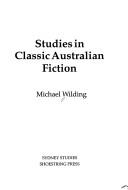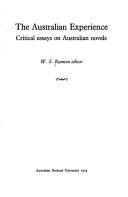| Listing 1 - 10 of 12 | << page >> |
Sort by
|
Book
Year: 1988 Publisher: North Ryde : Angus & Robertson Publishers,
Abstract | Keywords | Export | Availability | Bookmark
 Loading...
Loading...Choose an application
- Reference Manager
- EndNote
- RefWorks (Direct export to RefWorks)
Book
Abstract | Keywords | Export | Availability | Bookmark
 Loading...
Loading...Choose an application
- Reference Manager
- EndNote
- RefWorks (Direct export to RefWorks)
Book
ISBN: 0726904368 Year: 1975 Publisher: Stanmore : Cassell Australia,
Abstract | Keywords | Export | Availability | Bookmark
 Loading...
Loading...Choose an application
- Reference Manager
- EndNote
- RefWorks (Direct export to RefWorks)
Roman australien --- Roman australien --- 20e siècle --- Histoire et critique --- Roman australien --- Roman australien --- 20e siècle --- Histoire et critique --- Histoire et critique
Book
ISBN: 9780571253326 Year: 2011 Publisher: London : Faber & Faber,
Abstract | Keywords | Export | Availability | Bookmark
 Loading...
Loading...Choose an application
- Reference Manager
- EndNote
- RefWorks (Direct export to RefWorks)
Olivier is an aristocrat, the traumatized child of survivors of the French Revolution. Parrot the son of an itinerant printer who always wanted to be an artist but has ended up a servant. Born on different sides of history, their lives will be brought together by their travels in America.When Olivier sets sail for America, ostensibly to study its prisons but in reality to save his neck from one more revolution - Parrot is sent with him, as spy, protector, foe and foil. As the narrative shifts between the perspectives of Parrot and Olivier, and their picaresque travels together and apart - in love and politics, prisons and the world of art - Peter Carey explores the adventure of American democracy, in theory and in practice, with dazzling wit and inventiveness.
Roman australien --- Aristocratie --- Voyages. --- Valets (personnages) --- Amitié masculine. --- États-Unis

ISBN: 0949405132 Year: 1997 Publisher: Nottingham : Sydney, N.S.W : Shoestring press, Sydney association for studies in society and culture,
Abstract | Keywords | Export | Availability | Bookmark
 Loading...
Loading...Choose an application
- Reference Manager
- EndNote
- RefWorks (Direct export to RefWorks)
LITTERATURE AUSTRALIENNE --- ROMAN AUSTRALIEN --- 20E SIECLE --- 20E SIECLE --- LITTERATURE AUSTRALIENNE --- ROMAN AUSTRALIEN --- 20E SIECLE --- HISTOIRE ET CRITIQUE --- 20E SIECLE --- HISTOIRE ET CRITIQUE
Book
ISBN: 1846554020 9781846554025 Year: 2011 Publisher: London : Harvill Secker,
Abstract | Keywords | Export | Availability | Bookmark
 Loading...
Loading...Choose an application
- Reference Manager
- EndNote
- RefWorks (Direct export to RefWorks)
Life change events --- Roman australien --- 20e siècle --- Sydney (N.S.W.) --- 20e siècle
Book
ISBN: 9781604979350 Year: 2016 Publisher: Amherst, NY : Cambria Press,
Abstract | Keywords | Export | Availability | Bookmark
 Loading...
Loading...Choose an application
- Reference Manager
- EndNote
- RefWorks (Direct export to RefWorks)
This book takes as its subject a body of recent fiction by white liberal writers produced in the wake of the profound cultural, political and legal transformations that have taken place in the field of Indigenous rights since the 1990s. Two milestones of this period are the High Court of Australia’s Mabo ruling on June 3, 1992, and the Rudd Labor Government’s national Apology to Australia’s Indigenous Peoples on February 13, 2008. The novels explored in this study are Alex Miller’s Journey to the Stone Country (2002) and Landscape of Farewell (2007), Andrew McGahan’s The White Earth (2004), Kate Grenville’s The Secret River (2005) and Gail Jones’ Sorry (2007). Each of these novels was written in the period between 2002 and 2007. These were the years when the Indigenous rights and reconciliation movements had all but disappeared from the national political agenda through the interventions of the Howard Liberal Government. These works attempted to counter these silences as acts of literary activism, which strived to reignite the politically stalled processes of reconciliation. Through the medium of fiction, they kept Indigenous justice issues before the reading public, provoking discussion and stirring debate.White Apology and Apologia engages in close readings of the Mabo ruling, the national Apology and this body of fiction as a form of cultural history, which reflects important aspects of black/white relations in the past twenty-five years. Together, these legal, political and literary texts reveal a tension that arguably came to define this period. This tension fluctuates between a reconciliatory impulse of sorrow for Indigenous loss and the defensive desire to offer exits for white culture from the ongoing demands of a violent settlement history. Taking shape as twinned register of white longing, this conflicted cultural drive is the focus of this study.Each of these novels has had a significant reception and impact. All were shortlisted by the Miles Franklin Award with two taking out the coveted prize. While much critical attention has been given to their fictional explorations of reconciliation and the colonial past, this is the first study to focus on the novels as a collection of cultural artefacts from a brief but remarkable time in Australia’s recent history. In their attempts to explore Indigenous loss and dispossession, the novels can be seen as complex literary engagements with issues of the greatest moment in the contemporary public sphere. Together, they provide a significant snapshot of an ambivalent postcolonial culture in flux.Through an exploration of these important documents and texts of reconciliation, this study is able to offer symptomatic close readings of Australian liberal whiteness in the process of coming to terms with its troubling history. Providing new insights into how legal, historical, political, and literary discourses can influence each other in the quest for justice, White Apology and Apologia attempts to understand the relation between Australian literature and the culture that produced it. In the process it reveals the riven state of Australian postcolonial whiteness itself, which has been transformed by the legal, political and cultural shifts of the 1990s, yet which paradoxically resists its own deconstructions even as it longs for the dismantling of its own hegemony. The double movement of apology and apologia explored in this timely and important study is a startling reminder of the unresolved nature of the traumatized colonial legacy bequeathed to Australian settler culture by its history, and which continues to accompany white liberal discourse in its quest to heal its relations with the other.White Apology and Apologia is an important book for Australian literary and cultural studies collections.
Postcolonialisme. --- Aborigènes d'Australie --- Roman australien --- Dans la littérature. --- Histoire et critique.
Book
ISBN: 0198120095 Year: 1972 Publisher: Oxford : Clarendon Press,
Abstract | Keywords | Export | Availability | Bookmark
 Loading...
Loading...Choose an application
- Reference Manager
- EndNote
- RefWorks (Direct export to RefWorks)
Australian fiction --- Roman australien --- History and criticism. --- Histoire et critique --- Australia --- In literature.

ISBN: 0708106390 Year: 1974 Publisher: Canberra : Australian National University Press,
Abstract | Keywords | Export | Availability | Bookmark
 Loading...
Loading...Choose an application
- Reference Manager
- EndNote
- RefWorks (Direct export to RefWorks)
Australian fiction --- Roman australien. --- History and criticism. --- Australia --- Australie --- In literature. --- Dans la littérature.
Book
ISBN: 9781408829288 1408829282 Year: 2010 Publisher: New-York : Bloomsbury,
Abstract | Keywords | Export | Availability | Bookmark
 Loading...
Loading...Choose an application
- Reference Manager
- EndNote
- RefWorks (Direct export to RefWorks)
Aboriginal Australians --- Australian fiction --- Australiens (Aborigènes) --- Roman australien --- Aboriginal Australian authors --- Romans, nouvelles, etc. --- Auteurs aborigènes
| Listing 1 - 10 of 12 | << page >> |
Sort by
|

 Search
Search Feedback
Feedback About UniCat
About UniCat  Help
Help News
News